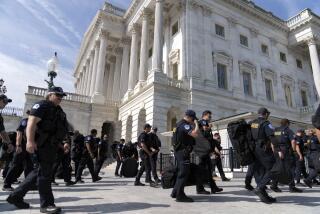Developments in Mideast Soften Criticism in Congress
- Share via
WASHINGTON — A dramatic string of positive developments in the Middle East in recent weeks appears to have deflated, at least for now, fierce congressional criticism of the Bush administration’s conduct of the war in Iraq.
One of the administration’s staunchest opponents, Sen. Edward M. Kennedy (D-Mass.), even said Sunday that President Bush deserved credit for what seemed to be a tentative awakening of democracy in the region.
“What’s taken place in a number of those countries is enormously constructive,” Kennedy said on ABC’s “This Week.” “It’s a reflection the president has been involved.”
Six weeks ago, in a speech at Johns Hopkins University’s School of Advanced International Studies, Kennedy was far more confrontational.
“We have reached the point that a prolonged American military presence in Iraq is no longer productive for either Iraq or the United States,” he said, calling for a phased U.S. withdrawal and comparing the involvement in Iraq with the quagmire the United States found itself in a generation ago in Vietnam.
But in Sunday’s comments, Kennedy recalibrated his earlier rhetoric.
Although Kennedy repeated his call for an eventual U.S. troop pullout, his language was milder and less urgent. He stressed that any timetable for withdrawal needed the agreement of the new Iraqi government.
“That’s the direction we want to go,” Kennedy said. “It does seem to me that we want the Iraqis to know it is their country. They’ve demonstrated that with the election.”
Another influential Democratic lawmaker, Assistant Senate Minority Leader Richard J. Durbin (D-Ill.), also set aside past differences with the administration over the invasion of Iraq, which he had called “the wrong decision at that moment.” On Sunday, he said that decision had brought signs of democratization in the region that could benefit the United States.
“I think there is a momentum for positive change in the Middle East, and I think the Democrats support that,” Durbin said on NBC’s “Meet the Press.”
Although both senators cautioned against reading too much into events in the region, neither said anything that could be construed as critical of the administration’s policy there. However, Kennedy noted the continuing casualties in Iraq, where about 1,500 U.S. service members have died since the beginning of the conflict in March 2003.
“We still have a long ways to go,” Kennedy said. “Two Americans are still getting killed every single day.”
Overall, the senators’ comments underscored a shift of mood on Capitol Hill about the Iraq war and the administration’s Middle East policy that has occurred since Kennedy’s Jan. 27 speech at Johns Hopkins.
Pessimism and frustration about developments in Iraq -- which had spread beyond the Democrats into the ranks of moderate Republican lawmakers -- has given way to cautious optimism, those who work in Congress say.
“It’s a feeling that these are exciting times -- or at least the prospect of it,” said Mark Helmke, an aide to Sen. Richard G. Lugar (R-Ind.), chairman of the Senate Foreign Relations Committee. Lugar has been one of several respected Republican voices in the Senate critical of the administration’s postwar planning failures in Iraq.
The skepticism in Congress was tempered by the Iraqi election three days after Kennedy’s January speech. In that vote, Iraqis braved death threats to come out in large numbers to choose their leaders. The balloting followed an election a few weeks earlier in which Palestinians chose their new president.
Then, in a period of a few days last month, Egypt’s President Hosni Mubarak announced a multiparty presidential election would be held this fall, Saudi Arabia conducted limited municipal elections, and Lebanese citizens came into the streets of Beirut to protest the assassination of their former prime minister, Rafik Hariri, and demand the withdrawal of about 16,000 Syrian troops. Those protests led the pro-Syrian government of Lebanon to resign.
“It’s similar to the feeling we had between 1989 and 1991,” Helmke added, referring to the years that included the fall of the Berlin Wall and the collapse of Soviet communism in Europe and, finally, the Soviet Union.
More to Read
Sign up for Essential California
The most important California stories and recommendations in your inbox every morning.
You may occasionally receive promotional content from the Los Angeles Times.










